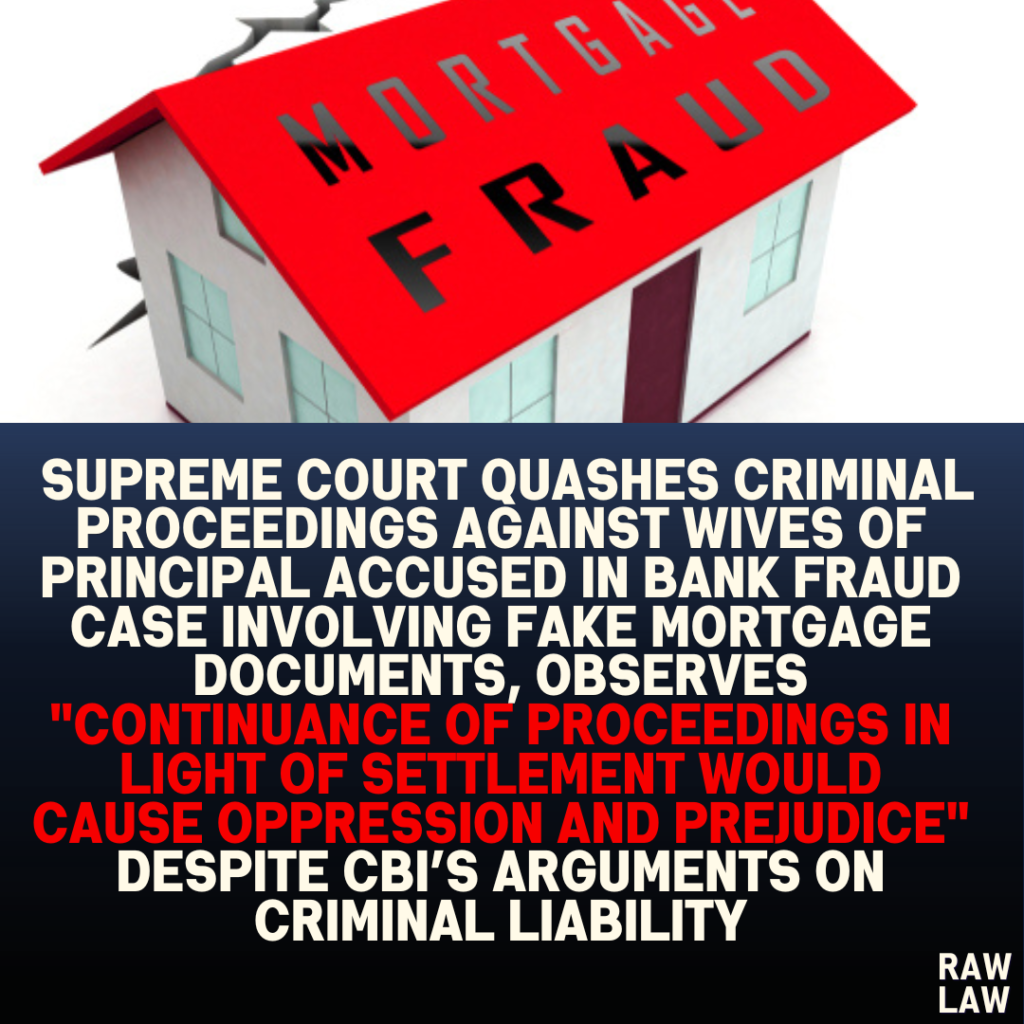Court’s Decision:
The Supreme Court allowed the appeal and quashed the criminal proceedings against the appellants in C.C. No. 16 of 2014 on the file of Principal Special Judge for CBI Cases, Nampally, Hyderabad. The Court found that since the matter involved a settlement between the Bank and the accused, the criminal proceedings had predominantly civil overtones. The Court observed that the specific role attributed to the appellants was limited, and further continuation of proceedings would be oppressive.
Facts:
- Loan Account Turned Non-Performing Asset (NPA): The accused persons, including the present appellants, were linked to a firm, M/s Sirish Traders, which availed credit facilities from the Indian Bank. Due to non-payment of dues, the loan account was declared an NPA on 31st March 2010.
- Complaint and Investigation: During the pendency of a recovery application before the Debts Recovery Tribunal (DRT), the Bank found that the mortgage documents submitted were fake and fabricated. Based on the Bank’s complaint, the CBI registered an FIR on 15th September 2012.
- Charge-Sheet and Offences: The CBI filed a charge-sheet against the accused, including the appellants, for offences punishable under Sections 120-B read with 420, 409, 467, 468, and 471 of IPC and Sections 13(1)(d) and 13(2) of the Prevention of Corruption Act.
- Settlement and Subsequent Criminal Petition: The accused and the Bank entered into a One Time Settlement (OTS) on 19th November 2015, which led to the Bank issuing a No Dues Certificate. The accused then filed a criminal petition before the High Court seeking quashing of the charge-sheet, which was dismissed by the High Court.
Issues:
- Whether the continuation of criminal proceedings is justified in cases where the dispute predominantly has a civil flavour and a settlement has been reached between the parties.
- Whether the role of the present appellants, as wives of the principal accused, warranted quashing of the proceedings.
Petitioner’s Arguments:
The petitioners argued that the appellants had no active role in the alleged offences and were merely implicated due to their relationship with the principal accused. It was further contended that the matter had been amicably settled with the Bank, and the continuation of proceedings would be an exercise in futility.
Respondent’s Arguments:
The CBI opposed the appeal, arguing that a settlement between the accused and the Bank cannot absolve the accused of criminal liability. The nature of the charges, involving forgery and fraud, were grave and required judicial scrutiny.
Analysis of the Law:
The Court analyzed the applicability of inherent powers under Section 482 of CrPC for quashing criminal proceedings. It referred to earlier judgments like Duncans Agro Industries Ltd., Nikhil Merchant, and Gian Singh, which established that criminal proceedings could be quashed where disputes predominantly bear civil flavour and involve commercial transactions.
Precedent Analysis:
The Court referred to multiple precedents, including:
- Duncans Agro Industries Ltd. v. CBI: Held that offences involving civil disputes with a financial background could be quashed if a settlement was reached.
- Nikhil Merchant v. CBI: Considered the quashing of criminal proceedings even for non-compoundable offences if it was predominantly a civil dispute.
- Gian Singh v. State of Punjab: Highlighted that the Court’s power under Section 482 CrPC could be exercised to quash non-compoundable offences when the dispute predominantly had civil facets.
Court’s Reasoning:
The Supreme Court emphasized that the role attributed to the present appellants was limited and arose solely due to their relationship with the principal accused. The Court found that the dispute had been settled through a One Time Settlement, and the Bank had received a substantial amount. In such circumstances, the continuation of criminal proceedings would be oppressive and cause undue prejudice.
Conclusion:
The Supreme Court quashed the criminal proceedings against the appellants. The Court held that in cases involving disputes of a civil nature, where a settlement has been reached and no specific role is attributed to the accused, it is appropriate to exercise the power under Section 482 CrPC to prevent abuse of process.
Implications:
This judgment reaffirms that in cases where criminal proceedings stem from civil disputes involving financial transactions, the inherent power of the Court can be invoked to quash the proceedings if a settlement has been reached. It highlights the importance of distinguishing between criminal liability and civil disputes and serves as a precedent for future cases involving settlements in banking and financial matters.



